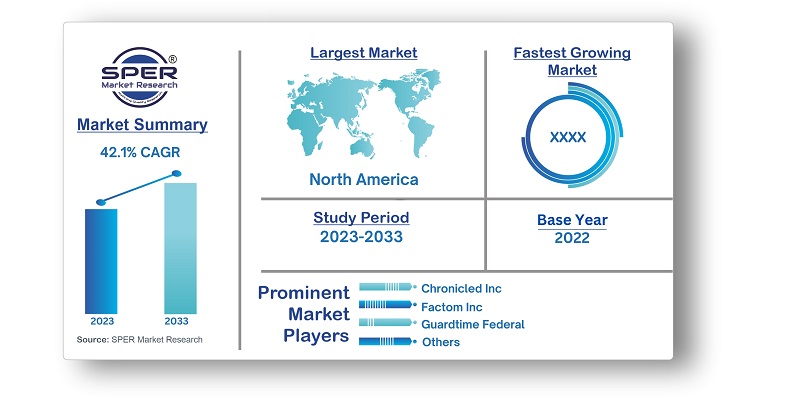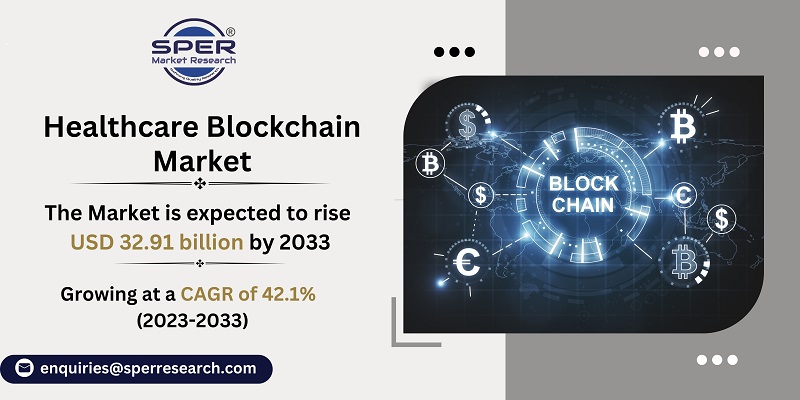
Healthcare Blockchain Market Growth, Size, Trends, Share, Demand, Revenue and Future Outlook
Healthcare Blockchain Market Size- By Network Type, By Application, By End User- Regional Outlook, Competitive Strategies and Segment Forecast to 2033
| Published: Oct-2023 | Report ID: HLCA2362 | Pages: 1 - 234 | Formats*: |
| Category : Healthcare | |||
- January 2022: Several renowned healthcare organisations have also backed Avaneer Health, giving the health network a start-up capital of USD $50 million. The network, which is built on blockchain technology, emphasises payer-to-payer data sharing, eligibility, and prior authorization while utilising HL7's FHIR specification to broaden data access among healthcare organisations.
- March 2022: According to Nokia, Equideum Health chose Nokia to assist in developing and delivering healthcare use cases. Equideum Health will make use of Nokia's Data Marketplace (NDM) solution, which is available through its Software-as-a-Service (SaaS) architecture. Equideum Health, a pioneer in the healthcare and life sciences blockchain, will be able to provide new use cases.


| Report Metric | Details |
| Market size available for years | 2019-2033 |
| Base year considered | 2021 |
| Forecast period | 2023-2033 |
| Segments covered | By Network Type, By Application, By End User |
| Regions covered | North America, Asia-Pacific, Latin America, Middle East & Africa and Europe |
| Companies Covered | Chronicled Inc., Factom Inc., Gem, Guardtime Federal, Hashed Health, IBM Corporation, iSolve LLC, Microsoft Corporation, Patientory Inc., PokitDok Inc., Others |
- Data Privacy and Cybersecurity Professionals
- Health Data Management Companies
- Health Insurance Companies
- Health Supply Chain Stakeholders
- Healthcare Consumers
- Healthcare IT Companies
- Healthcare Startups
- Hospitals and healthcare systems
- Pharmaceutical Companies
- Telemedicine and Remote Healthcare Providers
- Others
| By Network Type: |
|
| By Application: |
|
| By End User: |
|
- Global Healthcare Blockchain Market Size (FY’2023-FY’2033)
- Overview of Global Healthcare Blockchain Market
- Segmentation of Global Healthcare Blockchain Market By Network Type (Private, Public, Others)
- Segmentation of Global Healthcare Blockchain Market By Application (Claims Adjudication & Billing, Clinical Data Exchange & Interoperability, Clinical Trials & eConsent, Supply Chain Management, Others)
- Segmentation of Global Healthcare Blockchain Market By End User (Biopharmaceutical & Medical Device Companies, Payers, Providers, Others)
- Statistical Snap of Global Healthcare Blockchain Market
- Expansion Analysis of Global Healthcare Blockchain Market
- Problems and Obstacles in Global Healthcare Blockchain Market
- Competitive Landscape in the Global Healthcare Blockchain Market
- Impact of COVID-19 and Demonetization on Global Healthcare Blockchain Market
- Details on Current Investment in Global Healthcare Blockchain Market
- Competitive Analysis of Global Healthcare Blockchain Market
- Prominent Players in the Global Healthcare Blockchain Market
- SWOT Analysis of Global Healthcare Blockchain Market
- Global Healthcare Blockchain Market Future Outlook and Projections (FY’2023-FY’2033)
- Recommendations from Analyst
1.1. Scope of the report1.2. Market segment analysis
2.1. Research data source2.1.1. Secondary Data2.1.2. Primary Data2.1.3. SPER’s internal database2.1.4. Premium insight from KOL’s2.2. Market size estimation2.2.1. Top-down and Bottom-up approach2.3. Data triangulation
4.1. Driver, Restraint, Opportunity and Challenges analysis4.1.1. Drivers4.1.2. Restraints4.1.3. Opportunities4.1.4. Challenges4.2. COVID-19 Impacts of the Global Healthcare Blockchain Market
5.1. SWOT Analysis5.1.1. Strengths5.1.2. Weaknesses5.1.3. Opportunities5.1.4. Threats5.2. PESTEL Analysis5.2.1. Political Landscape5.2.2. Economic Landscape5.2.3. Social Landscape5.2.4. Technological Landscape5.2.5. Environmental Landscape5.2.6. Legal Landscape5.3. PORTER’s Five Forces5.3.1. Bargaining power of suppliers5.3.2. Bargaining power of buyers5.3.3. Threat of Substitute5.3.4. Threat of new entrant5.3.5. Competitive rivalry5.4. Heat Map Analysis
6.1. Global Healthcare Blockchain Market Manufacturing Base Distribution, Sales Area, Product Type6.2. Mergers & Acquisitions, Partnerships, Product Launch, and Collaboration in Global Healthcare Blockchain Market
7.1. Global Healthcare Blockchain Market Value Share and Forecast, By Network Type, 2023-20337.2. Private7.3. Public7.4. Others
8.1. Global Healthcare Blockchain Market Value Share and Forecast, By Application, 2023-20338.2. Claims Adjudication & Billing8.3. Clinical Data Exchange & Interoperability8.4. Clinical Trials & eConsent8.5. Supply Chain Management8.6. Others
9.1. Global Healthcare Blockchain Market Value Share and Forecast, By End User, 2023-20339.2. Biopharmaceutical & Medical Device Companies9.3. Payers9.4. Providers9.5. Others
10.1. Global Healthcare Blockchain Market Size and Market Share
11.1. Global Healthcare Blockchain Market Size and Market Share By Network Type (2019-2026)11.2. Global Healthcare Blockchain Market Size and Market Share By Network Type (2027-2033)
12.1. Global Healthcare Blockchain Market Size and Market Share By Application (2019-2026)12.2. Global Healthcare Blockchain Market Size and Market Share By Application (2027-2033)
13.1. Global Healthcare Blockchain Market Size and Market Share By End User (2019-2026)13.2. Global Healthcare Blockchain Market Size and Market Share By End User (2027-2033)
14.1. Global Healthcare Blockchain Market Size and Market Share By Region (2019-2026)14.2. Global Healthcare Blockchain Market Size and Market Share By Region (2027-2033)14.3. Asia-Pacific14.3.1. Australia14.3.2. China14.3.3. India14.3.4. Japan14.3.5. South Korea14.3.6. Rest of Asia-Pacific14.4. Europe14.4.1. France14.4.2. Germany14.4.3. Italy14.4.4. Spain14.4.5. United Kingdom14.4.6. Rest of Europe14.5. Middle East and Africa14.5.1. Kingdom of Saudi Arabia14.5.2. United Arab Emirates14.5.3. Rest of Middle East & Africa14.6. North America14.6.1. Canada14.6.2. Mexico14.6.3. United States14.7. Latin America14.7.1. Argentina14.7.2. Brazil14.7.3. Rest of Latin America
15.1. Chronicled Inc.15.1.1. Company details15.1.2. Financial outlook15.1.3. Product summary15.1.4. Recent developments15.2. Factom Inc.15.2.1. Company details15.2.2. Financial outlook15.2.3. Product summary15.2.4. Recent developments15.3. Gem15.3.1. Company details15.3.2. Financial outlook15.3.3. Product summary15.3.4. Recent developments15.4. Guardtime Federal15.4.1. Company details15.4.2. Financial outlook15.4.3. Product summary15.4.4. Recent developments15.5. Hashed Health15.5.1. Company details15.5.2. Financial outlook15.5.3. Product summary15.5.4. Recent developments15.6. IBM Corporation15.6.1. Company details15.6.2. Financial outlook15.6.3. Product summary15.6.4. Recent developments15.7. iSolve LLC15.7.1. Company details15.7.2. Financial outlook15.7.3. Product summary15.7.4. Recent developments15.8. Microsoft Corporation15.8.1. Company details15.8.2. Financial outlook15.8.3. Product summary15.8.4. Recent developments15.9. Patientory Inc.15.9.1. Company details15.9.2. Financial outlook15.9.3. Product summary15.9.4. Recent developments15.10. PokitDok Inc.15.10.1. Company details15.10.2. Financial outlook15.10.3. Product summary15.10.4. Recent developments15.11. Others
SPER Market Research’s methodology uses great emphasis on primary research to ensure that the market intelligence insights are up to date, reliable and accurate. Primary interviews are done with players involved in each phase of a supply chain to analyze the market forecasting. The secondary research method is used to help you fully understand how the future markets and the spending patterns look likes.
The report is based on in-depth qualitative and quantitative analysis of the Product Market. The quantitative analysis involves the application of various projection and sampling techniques. The qualitative analysis involves primary interviews, surveys, and vendor briefings. The data gathered as a result of these processes are validated through experts opinion. Our research methodology entails an ideal mixture of primary and secondary initiatives.



Frequently Asked Questions About This Report
PLACE AN ORDER
Year End Discount
Sample Report
Pre-Purchase Inquiry
NEED CUSTOMIZATION?
Request CustomizationCALL OR EMAIL US
100% Secure Payment






Related Reports
Our Global Clients
Our data-driven insights have influenced the strategy of 200+ reputed companies across the globe.




















